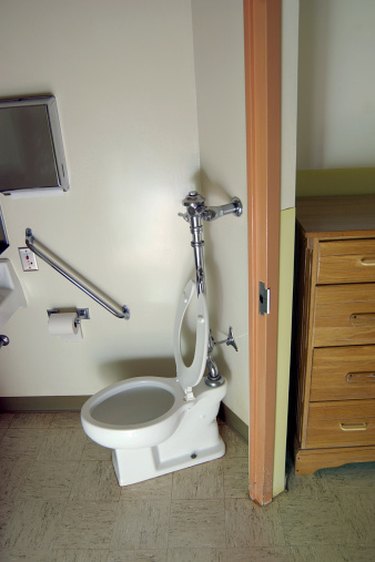
Modern toilets are connected to an elaborate plumbing system that takes waste not only out of the home but miles away to sewage and reclamation plants. In large part, because of this complicated system, toilets make a range of noises, some normal and some due to the malfunction or breakdown of one or more parts.
Moaning
Video of the Day
One of the most common noises heard from the toilet is a moaning, almost like the toilet is gasping for air. This sound is most often heard at night and happens when water pressure increases in municipal water systems. The sound is not caused by increased water pressure but by the water pressure putting too much strain on a worn or misaligned ballcock. As the ballcock ages, it loses its flexibility and, when pressed, it vibrates, generating the moaning sound. Buying a new ballcock and fill valve will solve nightly moaning from the toilet.
Video of the Day
Gurgling
Although a slight gurgling sound is normal during and shortly after flushing the toilet, a constant gurgling after flushing usually indicates a blocked vent. A level of suction is created in the pipework after flushing, and the pressure of that suction is relieved by another pipe that vents from the exterior of the home. If this vent pipe becomes clogged, suction builds up and air is pulled through the pipe system along with water causing a gurgling noise. Unclogging the vent will solve this problem.
Whistling
A toilet that whistles while it works is most often due to an outdated refill valve and ballcock assembly. Older systems fill much slower than new ones, and sometimes the amount of water pressure can increase to a point where the ballcock is propped open just enough to cause a whistling noise while filling with water after a flush. Updating the inner workings of the toilet, including a ballcock and refill valve, will eliminate whistling.
Trickling
Trickling, like gurgling, is also normal for a short period after flushing, but trickling that lasts more than a minute or two is a sign of fault in the toilet system. This problem is usually the result of a small leak in the flapper caused either by the chain catching on another part of the apparatus or a crack in the ring surrounding the flapper or valve seat. This problem is particularly expensive since the leak, if allowed to continue, can waste up to 120 gallons per hour trying to fill the tank.